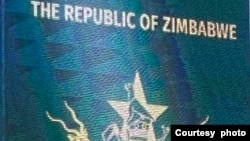Zimbabwe President Emmerson Mnangagwa today launched the country’s E-Passport, which will eventually phase out the current hard cover passports.
Launching the e-passport in Harare, President Mnangagwa said this was in line with the government's vision of a modernized economy through the application of advanced ICT systems.
According to Information Secretary, Nick Mangwana, the e-passports are designed to guarantee security for Zimbabweans and the reduction of the country’s passport backlog, currently estimated to be more than 185,000.
In a series of tweets, Mangwana said, “To help with context, so far 135 out about 200 countries in the world use e-passports. When e-visas are commonplace, those without e-passports will be at a massive disadvantage when undertaking foreign travel.
He said the introduction of Zimbabwe’s e-passport is designed to clear the passport backlog, the issuing of highly securitized biometric passports and provision of an efficient passport production system.
“The world is moving to a place where many countries will stop accepting passports which are not machine readable because of the risk of counterfeits in the context of threats from terrorism and organized crime. Zimbabwe is keen for its citizens not to suffer indignity at borders.
He further noted that the government is embarking on this project in partnership with Garsu Pasaulis (GP). “The new system will enable a production of 30 000 passports per day starting next year. The partnership will also produce National IDs, Birth Certificates and other security documents.
“Henceforth Govt will cease production of the passport as we know it and will commence production of e-passports. Those already holding the current one have exactly 2 years (until December 2023) to replace with e-passport. COST: Ordinary passport US$100 Emergency - US$200.”
Mangwana said there are 30 enrollment booths which have been established where biometric and photo shoots will be conducted during the passport application process.
“The passport application will be decentralized including to the Diaspora. The process is also going online. So far there are 15 Embassies which handle a lot Zimbabweans where the project is being rolled at. Ordinary Passport should come out in 7 days and Express Passport will take 48 hours. There is a queuing system that will be operating where people will get their numbers downstairs in a waiting area. One only goes upstairs to be processed at these counters and cubicles when they have been called up. People are people but this system is difficult to corrupt.
“We do understand the inconvenience that getting a new passport two years after getting your previous one may cause. We wish to assure the Nation that Govt recognizes the unavoidable distress this may cause. The major cost on our new passport is a production cost.”
But critics say the phasing out of the ordinary Zimbabwean passport is expected to be a money-generating scheme for the government, which is struggling to contain inflation and revive a subdued economy.





